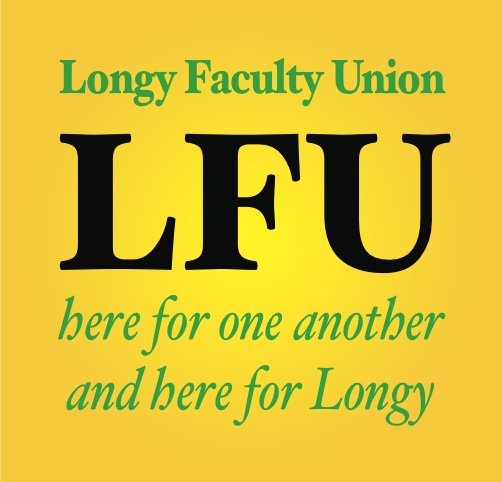|
The Longy Faculty Union Newsletter looks even better in your browser. |
||||||||
|
||||||||
In this issue
Contact Us
LFU in the press
News items
Stay tuned!
|
Judge issues injunction against Longy
Longy's bargaining responsibilitiesIn the order, she enumerates what some of Longy's bargaining responsibilities were and are, saying, "These included how it would decide to layoff or reassign faculty; whom it would decide to layoff or reassign; whether these faculty would be given a second chance to adjust to the new model; and what would happen with the employees that would be laid-off and reassigned." Furthermore, Longy's claim that the Union had waived its rights to bargain over effects was deemed "without merit." Judge Saris ruled, "Even though Longy offered to bargain over the effects of its decision, it never presented any willingness to bargain over a number of those effects, including the criteria for restructuring. The Union, thus, could not have waived its right to bargain over any of these issues." In Gulf States Manufacturing Inc. v. NLRB, 704 F.2d 1390, 1397 (5th Circuit 1983), the Fifth Circuit of the United States Court of Appeals ruled that, "It is, however, well established that a union cannot be held to have waived bargaining over a change that is presented to it as a fait accompli." As we have reported here in LFU News, Longy has steadfastly rebuffed the repeated demands of the LFU Negotiating Committee to bargain with the Union over the criteria for, and the conditions of, the "realignment," claiming that all aspects of the "realignment" were within its "management rights." The courts disagree with Longy's position, and Judge Saris has now added her voice to the consensus. The Second Circuit of the U.S. Court of Appeals has ruled that, "The most important interest of workers is in working; the Board may reasonably consider that an employer does not fulfill his obligations under 8(a)(5) [of the National Labor Relations Act] if he refuses even to discuss with employees' representatives on what basis they may continue to be employed." Cooper Thermometer Company v. NLRB, 376 F.2d 684, 688 (2nd Circuit, 1967). In First National Maintenance Corp. v. NLRB, 452 U. S. 666 (1981), the U.S. Supreme Court ruled, "There is no dispute that the union must be given a significant opportunity to bargain about these matters of job security as part of the 'effects' bargaining mandated by § 8(a)(5)." Referring to NLRB Board decision in Kendall College of Art, 288 NLRB 1205 (1988), Judge Saris explains that,
How the judge decides to issue an injunctionIn deciding whether to grant temporary relief in the form of an injunction under section 10(j) of the NLRA, a district court judge must decide whether there is "reasonable cause" to believe that an unfair labor practice has been committed and whether the relief is "just and proper." See In re Pye v. Sullivan Brothers Printers, Inc., 38 F.3d 58, 63 (1st Circuit, 1994). To prove to the court that injunctive relief is "just and proper," a petitioner must show four things:
Judge Saris found that "there is reasonable cause to believe that Longy has committed an unfair labor practice." Under the four-pronged "just and proper" test, she found that the health insurance benefits related claims of the NLRB "did not give rise to irreparable harm" so those were set aside. As for the section 8(a)(5) effects bargaining violation charges, she found that they met the test. On the 8(a)(1) charges about "futility" claims and coercion, she said, "The final determination of whether these statements violate § 8(a)(1) will be made after hearing live testimony concerning the context in which they were made. This Court is hesitant to perform its own analysis without having the same opportunity." In considering the "balance of the harms" (criterion 3 above), she decided that, because: "Longy has expressed some valid concerns about unscrambling all of the changes it made in March 2010 halfway through a school year ... the Court does not order Longy to return all terminated and reassigned faculty to the teaching assignments they would have had were it not for the realignment. Judge's order bolsters Union caseIn closing, Judge Saris summarizes her order: "The Court orders that Longy engage in bargaining over the effects of its decision to restructure the faculty. We are heartened and appreciative of the fact that Judge Saris has now added the weight of the U.S. District Court squarely on the Union's side of this struggle. In deciding that she believes, based on the record, that Longy has committed unfair labor practices, and in issuing an extraordinary, sweeping, and rapid order for injunctive relief, she has bolstered our struggle to win back the voice of Longy's faculty, and to build a successful and sustainable future for Longy. Honoring a "realigned" Union member who resigned: Frances Conover FitchPhoto © Susan Wilson, susanwilsonphoto.com
“I look forward to a bright horizon of teaching more at New England Conservatory and Tufts University, to traveling as a guest teacher to several other institutions in places like Japan, Israel and Georgia (USA), to achieving certification as a Body Mapping teacher in order to help other musicians of all ages, to finishing a book on continuo playing, and to take on more performing and recording. My private studio also continues and includes Community Programs students who have left Longy in order to carry on working with me.” One of Francie’s students, Emily Lau, has called Francie “the most versatile and talented conservatory teacher I have ever encountered.” When describing her academic and performance courses with Francie, Emily wrote “Through Francie, I have come to understand that ‘creating the magic’ is something attainable, through the thorough study of the subject matter, instead of something that only happens occasionally and mysteriously.” Another Longy student, Jane Chan, said, “I am very glad that I took the Research and Materials class taught by Dr. Frances Fitch. Presentation skills, the ability to conduct research about a topic, creating a thesis and outline, and lastly writing the essay itself is very important knowledge that every Masters degree student should acquire. Not only did I gain these skills, I also learned much about early music, especially figured bass. Dr. Fitch guided us through this learning process with a very professional and enthusiastic teaching attitude. I very much appreciated her clear instruction, systematic and organized way of teaching, as well as her sincere and friendly personality.” On December 11, Francie’s students, colleagues, and friends gathered together, shared some good time, and appreciated her contributions to the Longy community at a house party co-sponsored by the LFU. The visitors included current and former students, faculty colleagues (some of whom were not union supporters), friends, and family, all joining to thank Francie for everything she’s done for them, for the Early Music Department, and for Longy. Our heartfelt thanks, Francie, for your inspirational work at Longy. Best of luck in your future endeavors! Eric Rosenblith remembered
We were sad to learn of colleague Eric Rosenblith’s death in December 2010, after years of service on the Longy faculty. Mark Arroyo wrote the remembrance below about his eminent teacher. Arroyo is majoring in violin in the Undergraduate Diploma program at Longy. —The Editors
He was an opinionated man who was passionate and steadfast when it came to what he believed in or whom he cared about. His intellect and wit knew few equals, and his ability to break down a passage or technical concept and explain it in its most basic elements, so that any student would have a thorough understanding of it, is simply unparalleled. What I may have revered most about him was how incredibly modest he was. He thought that what he did was normal and to be expected of everyone and that in no way was he doing "something special." He also was there for his students outside of pure academia. Although he was quite wary and observant of the inherent boundaries one should observe in a teacher-student relationship, he never failed to be the trustworthy, supportive friend you might need in troubled times. Eric Rosenblith is my greatest inspiration. Before I started studying with him two years ago, I wasn't aware of how little I knew and how much I had yet to grow and achieve. I had no idea of the many variables and facets that could be at my disposal to create a rich and holistic performance. He opened my eyes and helped hone my musical and technical acuity more and more each lesson. Whereas others had told me that I would never really be able to achieve my dreams as a violinist, he dedicated himself wholly, encouraging, supporting, and guiding me so that I could maximize my potential and realize my possibilities! — Mark Arroyo Virtual office hoursPeople may try to contact members of the Board at any time to discuss important issues, but the virtual "office hours" are specifically set up for members of the LFU Board to take calls about Union issues. Upcoming times are:
Bargaining unit meeting
We hope everyone will be able to attend this meeting open to all collective bargaining unit Faculty Members this Tuesday, January 11, 2011 from 8:00 PM - 9:30 PM in the Wolfinsohn Room (Room 2) at Longy. The meeting agenda will include the recent injunction ruling by Judge Saris, as well as negotiation issues including compensation, benefits, evaluations, Union membership, job security, and more. Our previous meetings with CBU faculty have been very helpful in guiding the Negotiating Committee and the Executive Board. We look forward to additional input from all who attend. Continuing proposal updates are posted on our website here for your perusal. For those who cannot attend the meeting, please refer to the Virtual office hours story in this issue of LFU News for times when you can easily reach members of the LFU Executive Board on the phone with your comments, concerns, and questions. Additionally, you may contact any one of us at your convenience at our email addresses in the left column.
|





 In a
In a  A dedicated long-time faculty member at Longy, a former Early Music Department chair, and a mentor for many students, Frances Conover Fitch (“Francie” to her students and colleagues; see the June 10, 2010 issue of LFU News for
A dedicated long-time faculty member at Longy, a former Early Music Department chair, and a mentor for many students, Frances Conover Fitch (“Francie” to her students and colleagues; see the June 10, 2010 issue of LFU News for  That Eric Rosenblith was a master pedagogue and violinist is well-known and indisputable. But he was also a wise, caring, and dedicated man who taught me the meaning of devotion and what it means to love what I do. He was an indefatigable teacher, giving freely of his time and always making sure to give his students more than one hour a week; he believed that just one hour was not enough to allow for the musical growth he wanted for each of his students.
That Eric Rosenblith was a master pedagogue and violinist is well-known and indisputable. But he was also a wise, caring, and dedicated man who taught me the meaning of devotion and what it means to love what I do. He was an indefatigable teacher, giving freely of his time and always making sure to give his students more than one hour a week; he believed that just one hour was not enough to allow for the musical growth he wanted for each of his students.